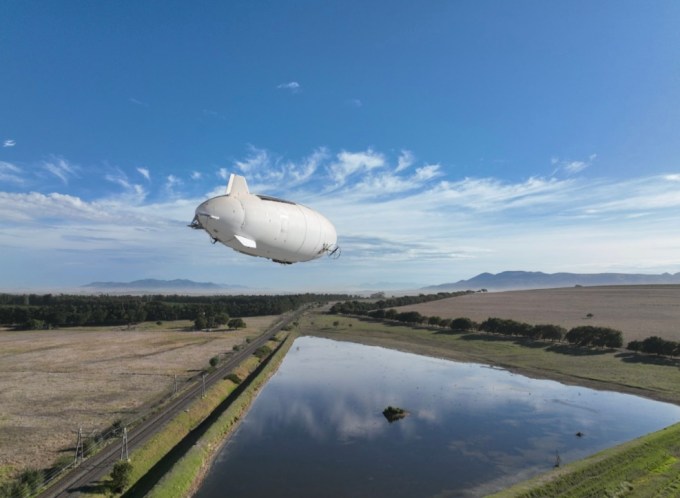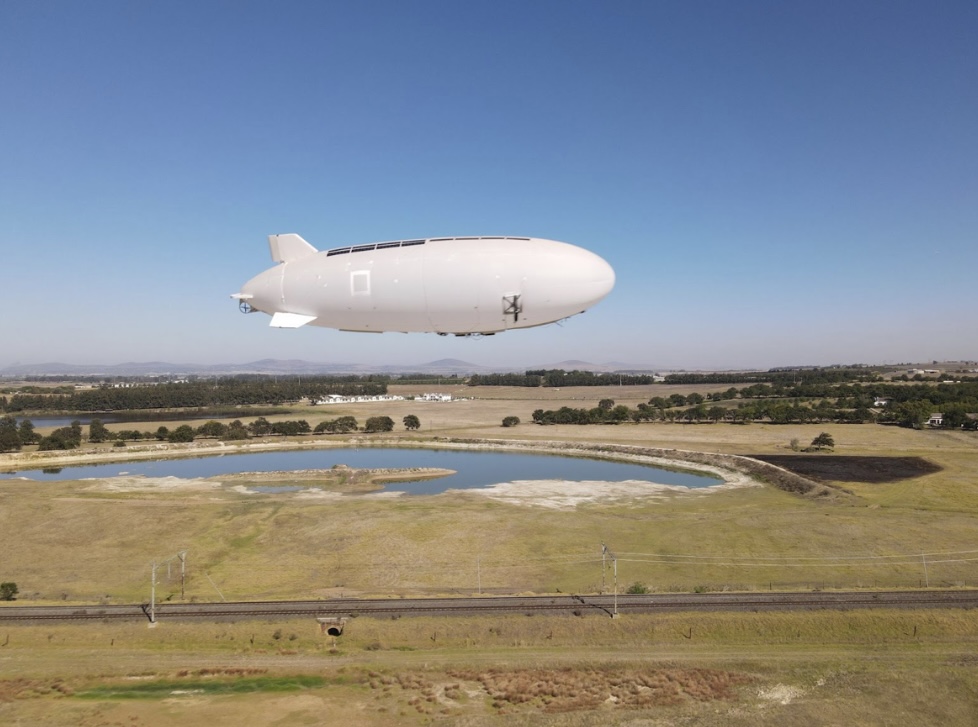South African aerospace startup Cloudline has secured $6 million in funding as it aims to lead the global frontier of carbon emissions-free autonomous flight.
Schmidt Futures, the philanthropic venture founded by ex-Google CEO Eric Schmidt and Wendy Schmidt, is an investor in the seed round. Other backers include pan-African funds such as the Raba Partnership, Verod-Kepple Africa Ventures, Enza Capital, 4Di and other venture firms.
When Cloudline founder and CEO Spencer Horne started the company six years ago, he intended to build a transport system connecting isolated communities to the global supply chain with deliveries of large payloads using lighter-than-air uncrewed aerial vehicles.
Horne’s interest in this moonshot project stemmed from his childhood fascination with trains and a broader passion for transportation technology, especially aviation, influenced by growing up near a railway crossing in South Africa — and despite facing challenges pursuing aeronautical studies in the U.S., Horne, a Harvard alum, returned to the continent to contribute to the field.
Horne spent two years at McKinsey to establish his professional network, which afforded him valuable travel experiences and insights into the diverse challenges African communities face. Working in East Africa, notably in Kenya and Uganda, highlighted the substantial impact of infrastructure on people’s lives.
2016 was pivotal as the first-mover drone delivery services targeting rural African consumers were underway. Zipline was initiating drone deliveries in Rwanda while Matternet was testing in Lesotho. After spending time learning about the market and tech, Horne founded Cloudline in 2019 at the intersection of technology, transportation and its implications on community outcomes.
Horne, in an interview with TechCrunch, said he wondered why these drone operators were involved with small single-dose deliveries or only delivered medical payloads. Horne’s viewpoint at the time was that an opportunity existed for drones to move items that could create real economic opportunities for Africans and bypass traditional infrastructure limitations.
“I’d done my degree in mechanical engineering and already inclined towards the tech, so I leaned into that and went down the rabbit hole — a little bit. And I realized that the tech doesn’t scale linearly in complexity with its size. If you want to make a bigger drone, sooner rather than later, you end up with an airplane or a helicopter again with all the costs and complexity,” Horne said.
“So the drone players were sticking in that domain because going outside of it was too much of a big hardware play. It became too expensive and too complex. And then I flipped the question: ‘So the drones have done this amazing work because we shrunk down helicopters and airplanes; what if we shrunk something else so we could also get to, like making the hardware easier, relying on the power of software and scaling with autonomy to unlock the opportunity?’ And that was really when I landed on airships.”
Horne and his team invested a significant amount of time in developing the necessary flight hardware designed for airships, and it wasn’t until three years ago that he came up with an MVP. Fast-forward to today, the startup, now employing 14 people, has refined its understanding of the opportunities in the autonomous flight sector, Horne said in the interview.
For instance, the team found interest and resonance with partners intrigued by aerial monitoring, a space Horne said he initially dismissed as an opportunity due to satellite and handheld DJI drone technology advancements. As such, Cloudline has identified specific areas where its application, offering long-distance real-time data or extended flight times for large regions, addresses critical needs. According to the CEO, this realization has unveiled a robust opportunity for the startup to extend the use of its platform into these applications.

Cloudline has created autonomous airships that provide a cost-efficient alternative to drones, helicopters and satellites, bringing real-time data capture to locations that are the hardest to reach and the most expensive to serve. The key strengths of these airships lie in their range, endurance and efficiency.
The startup says its airships can cover more than 400 km (250 miles) with a fully loaded payload of 40 kg (90 lbs) and operate for 10 hours, making it ideal for various applications, including mapping, monitoring and public safety.
These carbon emissions-free airship cruise flights are powered by helium gas for lift and sustained on solar power, supplemented by a battery backup, resulting in zero emissions and significantly reduced operating costs. Both resources give Cloudline an advantage over alternative crafts as partners can increase range without the need for larger aircraft or higher unit operating costs like fuel, addressing monitoring challenges that were previously difficult to solve.
“So it’s quite a breakthrough in that sense. The way we think about this now, just as a technology, is that this platform play can be game-changing in several ways. For instance, reaching areas that are typically either harder to reach or become incredibly expensive to serve,” Horne commented.
“So as soon as we get out of the density of cities, whether that’s suburban, rural or like completely remote, or nowadays in the increasing case where places are hit with like natural disasters, this is a platform that’s capable of bringing those places back within reach and budget, because the key thing is, it can be built cheaply here in South Africa, and it doesn’t burn any fuel.”
Cloudline operates in a relatively uncompetitive market due to its focus on hardware. While other drone operators within the autonomous aerial infrastructure space might pose some competition if they venture into airships, Horne stresses that Cloudline’s first-mover advantage gives the startup a strong position in the market.
According to him, Cloudline’s most robust intellectual property lies in integrating software with the hardware, particularly in creating autonomy for the airships. He argues that replicating this time-intensive process in the field is a significant challenge for any potential competitor, even with substantial financial resources. In addition, he says that the success or failure of drone companies doesn’t hinge on the functionality of their drones but on their ability to generate value for customers through a viable business model.
Cloudline’s approach to this challenge is evident in its beachhead strategy of developing solutions in Africa for the continent as its initial customer base and leveraging these use cases to enter the global market. This approach is beneficial, especially in regulatory interactions, as regulators have shown openness to collaborate with the Cape Town-based startup despite the innovative nature of its work.
YC grad Buoyant wants to solve middle-mile delivery with cargo airships
The six-year-old aerospace startup has quickly gained traction among customers such as governmental institutions seeking a platform capable of carrying various payloads, particularly multi-sensor payloads for aerial monitoring. Unlike conventional drone flights that use single sensors for specific data types, Cloudline says it combines visual, infrared, lidar and other sensor data in a single flight, creating a comprehensive data overlay. Utilities with linear infrastructure, such as powerlines, pipelines, railways and roads, can combine sensing for maintenance and security.
“We see serious interest from people in nature conservation, be it nature reserves, coastal monitoring or reforestation, who — ironically and often painfully — face the pain point of relying on hydrocarbon-fueled aircraft to do their work,” Horne stated. “We are emissions-free now, and we will continue to benefit from advances in green energy to extend our range and the capabilities of our aircraft.”
Horne says the startup launched its commercial operations in South Africa, where it has completed the regulatory approvals process. It is also actively working on expanding into neighboring countries, Namibia and Mozambique, before tackling global markets. Earlier in the year, Cloudline performed proving flights for authorities in Kenya, marking it as the first airship to fly in East Africa. According to him, Cloudline has seen revenue increase 4x during 2023, and the startup is projecting substantial growth for 2024, propelled by several new multi-million dollar enterprise contracts.
George Rzepecki, founder and CEO of Raba Partnership, speaking on the investment, said his firm was excited to back Horne, who “has assembled some of the world’s top engineering and product talent, building a category-leading company in the autonomous aerial infrastructure space.”































Comment